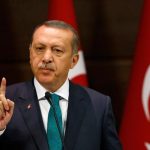The loss of the city of Istanbul to Turkey’s main opposition party would represent a huge personal blow to President Recep Tayyip Erdoğan, who rose to prominence as its mayor between 1994 and 1998.
But the ramifications will be financial and economic, as well as political.
Istanbul, which is Turkey’s largest city with a population of 16 million, has been governed by Erdoğan’s Justice and Development Party (AKP) and its predecessor for a quarter of a century. It is the biggest contributor to the country’s economy. In 2017, the city provided 1 trillion liras ($266 billion at historical exchange rates), in economic output, almost a third of the nation’s total GDP, according to official data.
According to preliminary election results on Monday Ekrem İmamoğlu, the candidate for the main opposition Republican People’s Party, was beating Binali Yıldırım, Erdoğan’s former prime minister, by nearly 28,000 votes from more than 8 million cast and with almost all ballots counted.
Announcing the figures, the head of the election board in Ankara, a city the CHP also took, said the body was considering appeals by Erdoğan’s Justice and Development Party (AKP), which focus on over 200,000 allegedly invalid voting slips.
The Istanbul municipality, known as Istanbul Belediye Başkanlığı, or IBB, is the city’s largest employer and its biggest economic actor. Some 19,000 people work for the central organisation, which oversees 30 companies including İğdaş, the city’s natural gas supplier, road builder Isfalt, and Ispark, which runs a large portfolio of car parks.
Despite a determined election campaign that took in scores of cities across the country and a compliant media, Erdoğan and his party stand to lose control of the administration after a currency crisis last year. The turmoil was sparked by fears of economic overheating and a political crisis with the United States, which sent economic growth into a tailspin and inflation surging to almost 20 percent.
IBB will spend 23.8 billion liras this year, including 1.39 billion liras on staff salaries, with revenue forecast at 20.6 billion liras, according to the municipal budget . The difference will be met with 3.2 billion liras of borrowing, it said.
The administration of the city, split into Asia and Europe by the winding Bosporus waterway, is heavily involved in flagship construction projects touted by Erdoğan as proof of Turkey’s regional and global importance.
Turkish Airlines, the country’s national airline, is due to move its headquarters to a vast new airport within the municipalities’ eastern boundaries this month. The facility, which reportedly cost $20 billion, has been much criticised by the CHP, which has accused the AKP of misspending taxpayers’ money. Vast highways and a tunnel under the Bosporus are also under construction, or in the planning phase.
Headline projects partly or solely under the city’s auspices also include a huge new museum next to the historic Topkapı Palace, its website shows. Furthermore, the municipality is redeveloping the city’s main Taksim Square, the scene of large public protests in 2013 that were violently quashed by Erdoğan and the city’s police force.
Since 1994, Erdoğan’s AKP and the now defunct Welfare Party, its Islamist predecessor, has populated IBB with its own supporters; from managers to cleaning staff and engineers to drivers. The CHP’s candidate could face a huge task in depoliticising the administration and, most likely, in appointing the party’s own supporters to replace the AKP cadre.
Erdoğan may also seek to starve the city of funds through the central government budget. The municipality, like others across the country, has debts and duty losses that the government has the power to forgive, restructure or demand payment for.
But undermining the new CHP administration financially also runs the risk of hurting the country’s economy, which like London in the U.K., is so reliant on the vast, crowded conurbation for its livelihood, particularly in such difficult economic times.
There is also the possibility that the CHP might find discrepancies in IBB’s accounts, which, if revealed, could expose an all too common practice in Turkey of dishing out contracts to partisan businessmen on favourable terms. For example, tenders for several tunnels in the city were reportedly approved without due recourse to public tender, with the government citing emergency laws meant to be used during times of natural disasters.
Meanwhile, prior to Sunday’s election, Erdoğan made a veiled threat against the CHP’s successful candidate for Ankara, Mansur Yavaş, saying on March 18 that he would pay a price if he won the vote. Turkey’s increasingly authoritarian president has previously used his powers of decree to displace pro-Kurdish mayors in the nation’s southeast with publicly appointed administrators, accusing them of terrorism.
Istanbul is the jewel in Erdoğan’s crown. It is unlikely that the combative president, who improved Istanbul’s infrastructure vastly when mayor, including making its water drinkable, will give up the city without a fight, whether that is through efforts to officially overturn an impending win for İmamoğlu, financially undercutting the new administration, or through legal pressure on the new mayor and his deputies.
By Mark Bentley,
Source: Ahval News
The opinions expressed in this column are those of the author and do not necessarily reflect those of Ahval.



